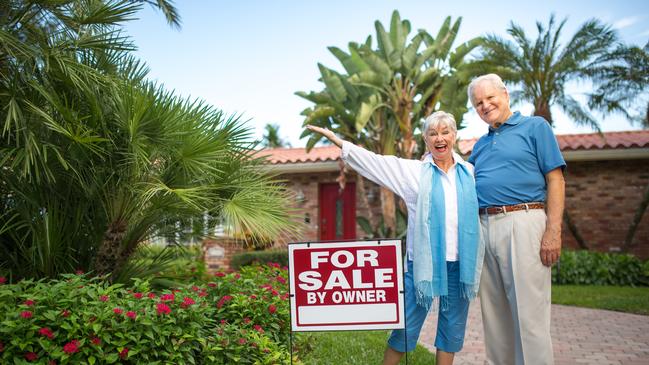Baby Boomers ‘demonised’ in housing debate
EXCLUSIVE | Peter Switzer calls for a national inquiry into restrictions on housing supply.

Veteran financial adviser Peter Switzer has called for a national inquiry into restrictions on housing supply, backing the assessment of Grattan Institute researcher Brendan Coates that “nimbyism” was making housing unaffordable for young people.
In the first episode of The Australian’s six-part podcast on housing, which discusses whether young people are doing it tough in today’s housing market, Mr Switzer accused Grattan of presenting a distorted picture of housing affordability that “demonised boomers”.
“There should be some sort of national inquiry into all the obstacles that are holding back the supply of properties in Australia. I’m not against house prices rising at a slower rate if it means that a lot more younger people can live where they want to live,” he said.
Brendan Coates said there was “a real reluctance to build more housing in quite a lot more of the attractive places to live in Melbourne and Sydney and that reluctance is quite rational and quite reasonable from those that are living there already”.
The new podcast series, titled On The Fence, covers all aspects of the housing market, from downsizing to property investment and to the national “obsession” with housing,
“I deeply respect Grattan but it’s just like a child. I might love my child but I’ve got to have the guts to tell him when he’s wrong,” Mr Switzer said, arguing the think tank exaggerated the decline in housing affordability for average households and ignored other factors.
“It’s relevant that 30 per cent of first-home buyers actually use the bank of mum and dad; it’s allegedly the fifth-biggest bank in terms of the allocations of money, and so a lot of these nasty, demonised boomers are actually redistributing wealth by helping their children getting into homes,” he said.
Signs of a rebound in Sydney and Melbourne house prices following a trifecta of official interest rate cuts since June is set to put housing affordability, especially for young home buyers, back on the political agenda.
Mr Coates said home ownership rates had “crashed”. “Thirty years ago, poor Australians did own their own homes. The rates were over 60 per cent; now the rates for the poorest 20 per cent of 25- to 34-year-olds is 20 per cent,” he said. “We’ve gone from a world where it used to take six years for the average household to buy the average house in Australia — to get the deposit — to 10.”
Mr Coates said Mr Switzer, along with other baby boomers (the generation born after World War II), “had ridden the decline in interest rates from their peak back in 1989 all the way down to today”. “And that’s certainly made his home much more valuable,” he said.
But Mr Switzer said baby boomers had also been “guilty of a most wonderful crime”, which he identified as 29 years of economic growth and low unemployment.
“The pressure should be on state governments, which can overrule local councils on those matters,” Mr Switzer said.
He added that boomers often had “pathetically low” average superannuation balances because the compulsory saving scheme began in 1992, when many were already in their 40s.
Mr Coates said it “certainly would help” if Australians could access super to save a deposit more quickly and “from there … buy a house”, but such a step would “ultimately be counterproductive” if it pushed up prices.
Mr Switzer said one of the reasons younger Australians found it harder to buy a house was because they were much luckier than the baby boomers “in the sense that they’ve got superannuation, which means that most of them will retire, in real terms, with probably a million dollars in super”.
Mr Switzer said Labor’s proposed crackdown on negative gearing and its plan to lift capital gains tax on investment properties had cost the party the May election.
Mr Coastes said the changes were in effect “taking, one, two billion dollars a year in taxes out of a six and a half trillion dollar housing market - you would need a microscope to see that at the end of the day,” he said.




To join the conversation, please log in. Don't have an account? Register
Join the conversation, you are commenting as Logout